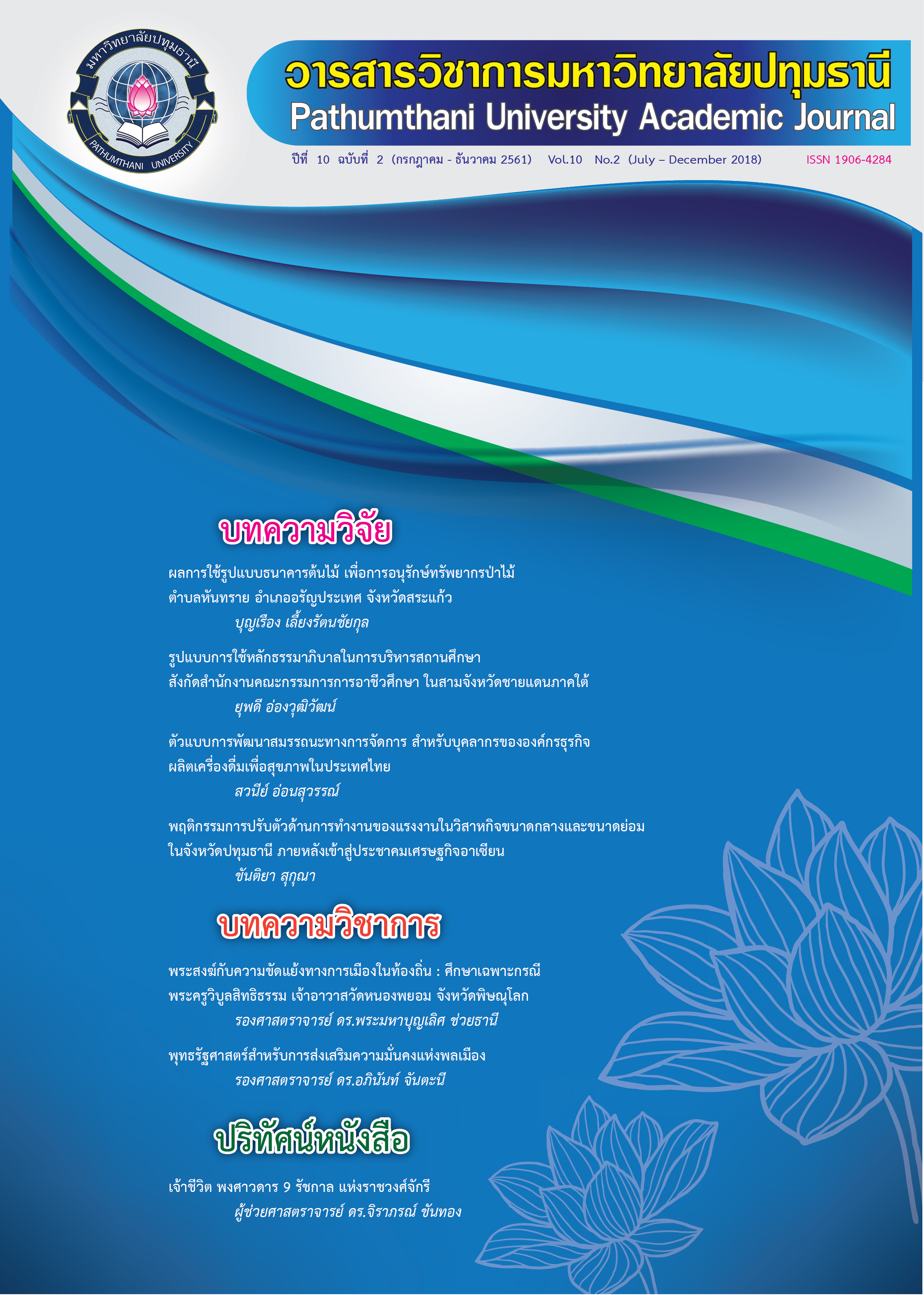พุทธรัฐศาสตร์สำหรับการส่งเสริมความมั่นคงแห่งพลเมือง
Keywords:
พุทธรัฐศาสตร์, การส่งเสริมความมั่นคงAbstract
The objectives of the research were: 1) to study the political science theory and promotion to citizen stability, 2) to analysis citizen stability in the state to ways of Buddhism, and 3) to present the ways for promotion to citizen stability to ways of Buddhism , by study and search for the document that about the stability of a citizen and interviewing manner deep according to regulations the way of quality research, which 12 keys informants of person , be 6 monks , and 6 persons householders, and synthetic for summarize in laws push stability way of a citizen follow Buddhism trend , the research result can summarize as follows,
In the findings to Buddhadhamma for promotion of the citizen statibility is Royal Sangahavathu 4, it is maintaining in validity, to promote the good behavior and people, to promote the people for right lifelihood, to speech polite with useful and reason, Saraniyathamma 6 to help an activity of partner group with the willingy, to show polite action and respect to each other in front and behind, help to advise the useful, to teach and advise with good hope, The Noble Eightfold are Right View, Right Thought, Right Speech, Right Action, Right Lifelihood, Right Effort, Right Mindfulness and Right Concentation. Natthakarana-dhamma 10 are assited Dhamma because it is supporting in dhamma performins be benefits for self and other to success in the widely, Aatta 3 is an usefulness in the present, which anyone perform with this dhamma whoever will recieved an usefulness in the present, Virtue3 is respecting each other which is respector in the nation, Buddhism and Monarch, Sangahavatthu 4 it is dhamma to support in each other and dhamma is the olds other mind is the principle to control the mind and upholding each other, Iddhipada 4 is the learnig link working to be success the Buddha teach is detail, by love and believe in that thing, then to do the beliving thing which receive themselve, Four Sublime states of mind it is Phra Prom’s Dhamma which Phra Prom performed, by is the dhamma of the elder which good wishing to other. The political science is relate for promotion of the citizen statibility, necessary primary requirement in the body, such as , food requirement, water, air, residence, to lifelihood and the requirement that safety in the life and assets, which be the statibility of the citizen in the state, and the ability of the state in welfare alms to people and the social, if the state can very the social welfare has to people very, The role of people social organization deduct less, by the leadership is the process that a leader uses the influence or the power to induce or persuade the subordinate within an organization, or the group of self in the any situation, for the member in the group performs duty of the efficiently, for achieve of the group or organization. The serve is social, education, healthiness, residence, the recreation and the process of justice, to promote development , giving aid, protection, prevention and editing. The public welfare arrangement by Buddhadhamma, be the given free-of-charge for who need something the assistance, because of they can not help them-self, have no chance social and lack of the supporter, which , be important duty of priestly monk something 2 in 6 a side, such as something the public aids, welfare public arrangement, in principle the Buddhadhamma that relate and is appropriate, Sangahavatthu4 and Four Sublime states of mind, Saraniyathamma 6 by aim to keep well and quality good life and last long, which, public welfare arrangement with system the arrangement serves social for protect, remedy, development and stability social promotion, to responsibility foundation necessity of people with quality of good life and can rely on them-self throughout and people participate in every social welfare level arrangement. For stability promotion of a citizen in the state by Buddha dhamma, use Suppurisadhama dhamma7 for bring to apply: knowing the cause, knowing the consequence, knowing oneself, sense of proportion, knowing how to choose and keep time, knowing the society, and knowing the different individuals, and perform the 5 precepts: don't kill the whole animal, don’t steal assets, to abstain from intoxicants, by abstain of 5 precept will bring the stability of the citizen, the stability promotion of the citizen should promote the residences side, health treatment, there are the food consumes, there are good educations, there is the work does and have enough income feed oneself and a family, there is the activity encourages to give a family and vigorous community, persist in a religion and the culture stability, there is the safety in the life and assets, there is the right and receive the fairness, participate in the decision making, attending activity political and have volunteer mind in the work for public social, appreciate the value of the resource together with conserve natural resources and the energy, and attend the activity for creation the safety of social power to create the stability happen with a citizen.
References
2. พระธรรมโกศาจารย์ (ประยูร ธมฺมจิตฺโต). (2549). พุทธวิธีการบริการ. มหาวิทยาลัยมหาจุฬาลงกรณราชวิทยาลัย.
3. พระธรรมปิฎก (ป.อ. ปยุตฺโต). (2543). ทศวรรษธรรมทัศน์พระปิฎกหมวดศึกษาศาสตร์.กรุงเทพมหานคร : ธรรมสภา.
4. พระมหาสมบูรณ์ วุฑฺฒิกโร. (2549). “ประเด็นโต้แย้งว่าด้วยพระพุทธศาสนาเพื่อสังคม”. วารสารบัณฑิตศึกษาปริทรรศน์. ปีที่ 2 ฉบับที่ 4 ตุลาคม – ธันวาคม 2549.
5. ธีรยุทธ บุญมี. (2551). ธรรมรัฐแห่งชาติยุทธศาสตร์กู้หายนะประเทศไทย. กรุงเทพมหานคร : ชมรมนักธุรกิจเพื่อ ประชาธิปไตย.
6. ประเวศ วะสี. (2541). การบริหารกิจการบ้านเมืองและสังคมที่ดี. กรุงเทพมหานคร : สถาบันพัฒนาข้าราชการพลเรือน.
7. วิรุฬห์ศักย์ แนวภูวนนท์. (2556). “ศึกษาการจัดสวัสดิการชุมชนของวัดพระธาตุช่อแฮ”. สาขาวิชาพระพุทธศาสนา วิทยาเขตแพร่ มหาวิทยาลยัมหาจุฬาลงกรณราชวิทยาลัย.
8. สุดจิต นิมิตกุล. (2543). การบริหารกิจการบ้านเมืองและสังคมที่ดีการปกครองที่ดี (Good Governance). กรุงเทพมหานคร : บริษัทพัธการพิมพ์.
9. อภินันท์ จันตะนี. (2557). ระเบียบวิธีวิจัยทางการจัดการชั้นสูง. กรุงเทพมหานคร : จรัญสนิทวงศ์การพิมพ์
Downloads
Published
How to Cite
Issue
Section
License
บทความที่ได้รับการตีพิมพ์เป็นลิขสิทธิ์ของวารสารมหาวิทยาลัยปทุมธานี
ข้อความที่ปรากฎในบทความแต่ละเรื่อง เป็นความคิดเห็นส่วนตัวของผู้เขียน กองบรรณาธิการไม่จำเป็นต้องเห็นด้วยเสมอไป และไม่มีส่วนรับผิดชอบใด ๆ ถือเป็นความรับผิดชอบของผู้เขียนแต่เพียงผู้เดียว



